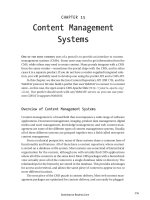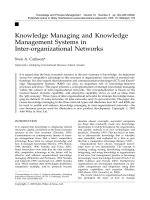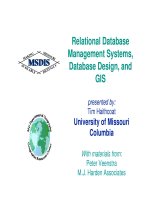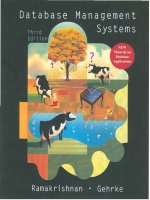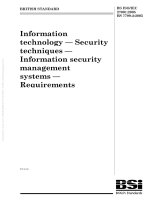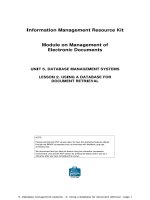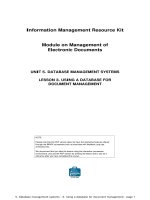Implementation open-source gis in road asset management systems in Uzbekistan
Bạn đang xem bản rút gọn của tài liệu. Xem và tải ngay bản đầy đủ của tài liệu tại đây (1.54 MB, 7 trang )
IMPLEMENTATION OPEN-SOURCE GIS IN ROAD ASSET
MANAGEMENT SYSTEMS IN UZBEKISTAN
VALENTIN V. SILYANOV1,4, IBRAGIM S. SADIKOV1,3, JAMSHID I. SODIKOV2,3
1
D.Sc.,Professor, 2D.Sc., AssociateProfessor,
3
Tashkent Highway Engineering Institute, 20, prospect Amir Timura,
Tashkent, 100060, Republic of Uzbekistan,
4
StateTechnical University-MADI,64, Leningradskiy prospect, Moscow, 125319, Russia
Corresponding author’s email:
Abstract: Open-source software is widely used in academia and industry. The paper
highlights the major advantages of open-source QGIS software in road asset management in
Uzbekistan. It shows steps on how to obtain maps and importing road conditions data. QGIS
offers wide ranges of functionality to visualize, analyze and manage road condition data. Road
M39 was selected for analysis and road conditions data were used to visualize the IRI
roughness index.
Keywords: QGIS, GIS, open-source, road asset management
Received: 05/10/2019
Accepted: 29/11/2019
Published online: 14/06/2020
Currently, road conditions and inventory surveys are carried out by using sophisticated
multi-sensor vehicles and by a manual visual survey. So there are challenges to overcome
paper-based technology and implementation electronic document exchange technology. For the
past two decades, GIS technology emerged to the level that it can easily solve the problem, by
quickly and conveniently visualize and analyze road data. This article discusses the application
of GIS technology in road condition and inventory data, traffic accident data analysis using
open-source QGIS software. Open-source software allows without a paid license to use, create
additional plug-ins and tools for solving certain tasks in almost any area of the economy.
Therefore, this software is widely used in research and development. Data plays an important
role in decision making, the quality of the data, the way how it is analyzed and visualized assists
decision-makers to accept right or wrong decisions. This, in turn, will lead to saving or
overusing limited financial resources.
A number of research papers addressed the importance of GIS in road asset management.
The authors [1] developed recommendations for an inventory of traffic and pedestrian traffic
lights in Tashkent using geographic information systems (GIS). An inventory of traffic and
pedestrian traffic lights will allow a timely assessment of the condition, as well as the
development of measures to improve traffic management. The advantage of using GIS
technology in the inventory allows you quickly and accurately determine the number and status
of traffic and pedestrian traffic lights. In developed countries, there is a phenomenon of
16
INTERNATIONAL COOPERATION ISSUE OF TRANSPORTATION - Special Issue - No. 10
reducing the number of traffic lights, since the larger their number, the more difficult it is to
solve the problem of traffic management [2].
Authors [3] discussed the role of benchmarking in assessing the value of road projects.
They used road cost data dated from 2007 to 2009, which includes the following types of road
works, such as periodic and rehabilitation works. The analysis and visualization of cost data
carried out using software R and GIS. The results of the study revealed in which regions of
Uzbekistan the cost exceeds the average cost in the country. The authors concluded that the
results of processing the cost database made it possible to assess the general picture of the cost
variation by regions. It should be noted that the costs in a certain region may vary, despite the
fact that external factors of influence are common to all of Uzbekistan. Summarizing these
statistics, it can be concluded that internal factors have a greater influence on the formation of
value. Authors [4] proposed an electronic accident registration card has several advantages and
will save police officers time. First of all, after arriving at the scene, the police officer takes a
photo via a mobile phone or tablet which has geotagging functionality that will allow
visualizing an accident in an electronic map (QGIS, ArcGIS, or Google Fusion). Then it can be
accessed to the database which contains a driver’s license to determine the characteristics of the
driver/vehicle. The electronic accident registry significantly reduces the time, increases the
accuracy and reliability of the data. Since geolocation accurately fixes the location of the
incident, no orientation is required on buildings and structures for reference which is used in
practice. All data is stored locally and remotely on the server. Author [5] deployed google
fusion tables to visualize road accidents in Tashkent city. Based on the visualization and
analysis of accident data in Tashkent, the following conclusions are made: accidents often occur
in certain sections of streets and roads in Tashkent city; the main types of accidents are collision
between vehicles (type 1) and collision with pedestrian (type 5); An analysis of road accidents
in the context of deceased and injured by type of accident revealed that pedestrians are the most
vulnerable road user; in a collision, the number of injured is significantly greater compared to
other types of accidents; when hitting an obstacle (type 4), the prevailing number of victims is
166 injured and 12 dead. Author [6] reviewed road traffic accident data analysis and
visualization in the R programming environment. The aim was to show how to extract
meaningful data from the raw database and visualize it. The results revealed that hour wise, day
wise, month wise and year wise plots allowed observing how road traffic accidents change in
the timescale. Two types of road traffic accidents mainly occurred such as type 1 (collision) and
type 5 (collision with pedestrian). Both types of road traffic accidents happened in similar
magnitudes across all timescales. Visualization and data analysis of road traffic accidents led to
make conclusions that would assist reduce the number of accidents. Authors [7] conducted a
road condition survey in Akita Prefecture and utilized GIS to visualize road conditions. It
concluded that In order to have well-organized road asset management, it requires conducting a
comprehensive set of road surveys such as Local Reference Points (LRP), Roughness (IRI) and
Global Positioning System (GPS) surveys and Video logging. Additionally, data management of
collected data is worth-mentioning aspect.
INTERNATIONAL COOPERATION ISSUE OF TRANSPORTATION - Special Issue - No. 10
17
The paper provides database formation and how to visualize maps, IRI roughness is taken
as a key indicator for evaluating road conditions. For practicality and demonstration purposes,
certain road sections were selected. A list of highways that were used for analysis was provided
by “Yul Loyiha Expertiza” (Tab. 1).
Table 1. List of roads and length
№
Title of roads
Length, km
65
1
М39 “Almaty - Bishkek - Tashkent - Shahrisabz – Termez”
М39b“ Tashkent Ring Road”
67
2
3
4
5
М34 “Tashkent – Dushanbe”
71
А373 М“39 highway - Gulistan - Buka - Angren - Kukan and
via Andijan – Osh”
А373“ аCollector road to Tashkent city”
155
4Р2 “Tashkent city - Nuravshon city - А373 highway (55
km)”
4Р3 “Tashkent city - Mineral suvlar sihatgohi - Abay”
42
49
13
6
4Р4 “Tashkent - Keles. - Qozoqkentsoy - М39 highway (820
km)”
28
7
4Р5 “Tashkent - Qibrai - May”
21
8
4Р6 “Tashkent- Chirchiq - Chimyon”
87
The following steps carried out to create a GIS map of the Tashkent region in QGIS
software: Source maps were obtained from open sources (Open Streep Maps). At the
first step, maps of Uzbekistan were loaded (Fig. 1a) and a map of the Tashkent region
was highlighted (Fig. 1b).
Fig 1a. Map of Uzbekistan
18
Fig 1b. Map of Tashkent region
INTERNATIONAL COOPERATION ISSUE OF TRANSPORTATION - Special Issue - No. 10
In the second step, we modify attributes of the roads layer, there can be seen existing data
in the database (Fig. 2). Each column has a name title that describes the data in the columns.
The road number is stored in the “ref” column. To highlight the studied roads in the Tashkent
region, a filter is used with which can be selected according to several criteria.
Fig. 2. Attributes of roads layer
In the third step, using the selection by value command, in the line “ref” we select “M39”.
As a result, all sections of the road with attributes “M39” will be highlighted on the map (Fig.
3).
Fig 3а. Selection with certain parameter
Fig 3b. The outcome of selection
INTERNATIONAL COOPERATION ISSUE OF TRANSPORTATION - Special Issue - No. 10
19
In the fourth step, we save the selected object on a separate layer (Fig. 4). Next, we divide
the road into sections with a length of 1 km. This is done by the algorithm of the program
“v.split.length” (Fig. 5).
Fig 4. Saving objects in separate layer
Fig 5. Road sectioning
Next, in order to form a database, it is required to enter information for every 1 km. If
necessary, you can add the necessary fields in the attribute table in which data about the road
will be displayed (Fig. 6). In this example, chainage, geometrical data (carriageway width,
pavement width, etc.) and surface condition characteristics (friction coefficient, IRI, visual
scoring, etc) were added.
Fig 6. Forming road geometry characteristics
Based on these data, we can analyze, process the data, and identify the worst road sections.
By applying classification function by values in the QGIS program, we can divide road sections
on a map. The IRI value was used to create a thematic road map. Classification according to the
condition of roads was made according to the following colors: green - satisfactory, red - not
satisfactory (Fig. 7-8).
20
INTERNATIONAL COOPERATION ISSUE OF TRANSPORTATION - Special Issue - No. 10
Fig 7. Tashkent ring road condition thematic map
Fig 8. Close-up map of road condition.
GIS technology assists to quickly extract data, make analysis and data processing, it creates
a convenient way and timely update of the database and identification of worst road sections.
The paper attempts to highlight basic functionalities of GIS technology in the creation of road
condition thematic maps, which will facilitate the adoption of correct and timely decisions in
INTERNATIONAL COOPERATION ISSUE OF TRANSPORTATION - Special Issue - No. 10
21
planning, design, and maintenance.
When analyzing the M39b Tashkent Ring Road, road sections were identified that require
repair if the compliance threshold is exceeded according to the international IRI index> 3 m /
km. The advantage of using GIS in the road condition survey allows you to quickly analyze and
visualize problematic road sections. The transition from paper to electronic technology will
quickly solve the problems facing the road organization.
Based on the results, the following conclusions are proposed:
• For prompt and adequate decision-making, a unified electronic database of public roads
should be developed.
• To ensure the transition from existing paper technology to electronic databases and it’s
required to develop a road database.
• Implementation of existing methods of applying GIS technology to ensure traffic safety
in Tashkent, an inventory of traffic lights.
• The widespread use of GIS technology in the road industry can improve the reliability of
data and provide an overestimation of the cost of road projects.
In summary, road asset management is a complex and multi-component system that
consists of road data collection, road data management, pavement performance modeling, road
asset cost estimation and budget optimization, traffic safety measures, and others. Each road
agency determines which RAMS component can be included depending on available financial
resources. The key factor is how to collect road condition data, how much data need to be
collected, how to store it and how to analyze and visualize these data in order to make the right
decision making. The paper highlights useful features open-source GIS software to visualize
and to make an analysis of road condition data.
References
[1]. Silyanov V.V., Sodikov J.I., Traffic lights inventory in Tashkent city by implementing GIS
technology, Transport systems of Siberia. The development of the transport system as a catalyst
for the growth of the state economy. International Scientific and Practical Conference
(Krasnoyarsk, April 7-8, 2016): proceedings: in 2 volumes. Vo. 1 / 2016. pp.470-474. (in
Russian).
[2]. Martin Cassini and Richard Wellings, Traffic controls and the economy, 2016:
(Accessed:
10.01.2016).
[3]. Silyanov V.V., Sodikov J.I., Shayhudinnov A.T., The role of benchmarking in assessing the
value of road projects», Science and technology in the road sector, No3, 2017, pp. 3-5.
[4]. Karabaev A. M., Sodikov J.I., E-registration of traffic accidents by incorporating GIS
technology, Vestnik TashIIT No1. 2018. (in Russian).
[5]. Sodikov J.I., Visualization of road accidents using Google Fusion Tables., Institute report
TIDCMH, No. 2, 2018. (in Russian)
[6]. Sodikov J.I. Road Traffic Accident Data Analysis and Visualization in R, International
Journal of Computer Science Engineering and Information Technology Research (IJCSEITR)
ISSN (P): 2249-6831; ISSN (E): 2249-7943 Vol. 8, Issue 3, Jun 2018, 25-32
[7]. Sodikov J.I., Koji-Tsunokawa, Ul-Islam Riaz, Road Survey with ROMDAS System : A
Study in Akita Prefecture, The Science and Engineering Reports of Saitama University (38),
149-151, 2005, Faculty of Engineering, Saitama University.
22
INTERNATIONAL COOPERATION ISSUE OF TRANSPORTATION - Special Issue - No. 10
